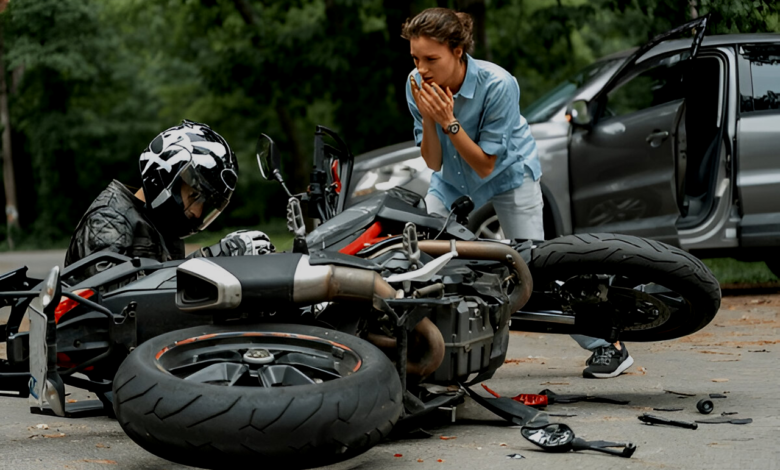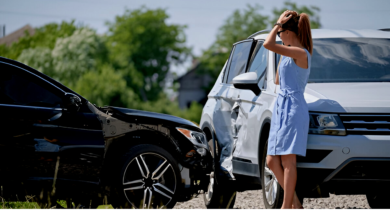Motorcycle Accident Legal Help in California Your Rights Explained
Motorcycle accident legal help in California Know your rights to compensation after a crash. Get expert guidance on claims & lawsuits today.

Motorcycle accidents can be devastating, leaving victims with severe injuries, overwhelming medical bills, and long-term emotional trauma. If you’ve been involved in a motorcycle accident in California, understanding your legal rights is crucial to securing fair compensation. California law provides specific protections for motorcyclists, but insurance companies often try to minimize payouts or shift blame onto riders. Knowing how to protect yourself legally can make the difference between recovering fully or facing financial hardship due to someone else’s negligence.
In this guide, we’ll explain everything you need to know about motorcycle accident legal help in California, including your rights, steps to take after a crash, and how to build a strong claim. Whether you’re dealing with insurance disputes, proving fault, or considering a lawsuit, being informed will help you make the best decisions for your case. By the end, you’ll understand how California’s laws apply to motorcycle accidents and why having an experienced attorney on your side can significantly impact your outcome.
Motorcycle Accident Legal Help in California Your Rights Explained
California’s Fault-Based System and Unique Motorcycle Laws
California operates under a fault-based system for motorcycle accidents, meaning the rider or driver who caused the crash (or their insurance) must pay for damages. This differs from no-fault states where each party files with their own insurer regardless of fault. Key California-specific laws that affect liability include Helmet Laws: While California does mandate helmets for riders and passengers (Vehicle Code §27803), failure to wear one could potentially impact a claim if it contributed to injuries. Lane Splitting: Legal under California law (AB 51, 2016) when done safely, but reckless splitting (e.g., at high speeds) may shift partial blame to the motorcyclist.
Proving Negligence in Motorcycle Accident Claims
To win a claim, you must prove the other party breached their duty of care and caused the accident. Critical elements include Evidence Collection Police reports document official observations and citations. Witness statements provide unbiased accounts of the crash. Traffic/security cameras may capture the incident. Black box data from vehicles can reveal speed or braking patterns. Common Negligent Behaviors Left-turn accidents (the #1 cause of motorcycle crashes, per NHTSA). Distracted/drunk driving (texting, DUIs).
Steps to Take After a Motorcycle Accident
Immediate Post-Accident Actions for Evidence Preservation
After a motorcycle accident, your first priority should be seeking immediate medical attention even if you feel fine since serious injuries like concussions or internal bleeding often have delayed symptoms, and this medical documentation creates a crucial link between the accident and your injuries. Simultaneously, you must preserve legal evidence by calling 911 to file an official police report (required for injury claims in California), thoroughly photographing the scene from all angles including vehicle positions, skid marks, traffic controls, road hazards, and your damaged protective gear (which can demonstrate crash severity).
Strategic Communication with Insurers and Legal Protection
Navigating insurance claims after a motorcycle accident requires careful strategy to avoid common pitfalls. While you must notify your insurer promptly to comply with policy requirements, limit your communication to basic facts and never provide recorded statements without consulting attorney insurers often use these to minimize payouts. Be wary of early settlement offers, as they’re frequently undervalued before the full extent of injuries is known. An experienced motorcycle accident attorney provides critical advantages by handling all insurer negotiations to prevent damaging missteps, while also acting quickly to preserve time-sensitive evidence such as surveillance footage that may be automatically deleted after 30 days.
Common Causes of Motorcycle Accidents in California
Motorcycle accidents often occur due to the negligence of other drivers. Some of the most frequent causes include Left-turn accidents When a car turns left in front of a motorcycle, misjudging its speed. Lane changes and merging collisions Drivers failing to check blind spots before switching lanes. Distracted driving Texting, eating, or other distractions leading to inattention. Drunk driving Impaired motorists posing a severe risk to motorcyclists. Road hazards Potholes, debris, or uneven pavement causing loss of control. Understanding these common causes can help strengthen your claim by identifying liable parties.
Proving Liability in a Motorcycle Accident Case
To win a motorcycle accident claim, you must prove that the other party was at fault. California follows comparative negligence rules, meaning if you are partially responsible (e.g., speeding), your compensation may be reduced by your percentage of fault. Key evidence to support your case includes Police reports Official documentation of the accident scene. Medical records Linking injuries directly to the crash. Eyewitness testimony independent accounts of how the accident happened. Expert analysis Accident reconstruction specialists can clarify fault. Closed-circuit television (CCTV) Traffic or security cameras capturing the incident. An experienced attorney can help gather and present this evidence effectively.
Types of Compensation Available
Motorcycle accident victims may be entitled to various forms of compensation, including medical expenses Emergency care, surgeries, rehabilitation, and future treatments. Lost wages Income lost due to recovery time or disability. Pain and suffering Physical and emotional distress caused by the accident. Property damage Repair or replacement of your motorcycle and gear. Punitive damages in cases of extreme negligence (e.g., drunk driving). Insurance companies often try to settle quickly for low amounts, but a skilled lawyer can negotiate for a fair payout or take your case to court if necessary.
Why You Need a Motorcycle Accident Attorney
Handling a motorcycle accident claim alone can be overwhelming, especially when dealing with injuries and insurance companies. A knowledgeable attorney can Investigate the accident thoroughly. Handle communications with insurers. Calculate the full extent of your damages. Negotiate settlements or represent you in court. Without legal representation, you risk accepting an inadequate settlement that doesn’t cover long-term costs.
Read More: Healthcare Fraud: Detecting, Reporting, and Preventing
Conclusion
If you’ve been injured in a motorcycle accident in California, understanding your legal rights is the first step toward securing the compensation you deserve. From dealing with insurance companies to proving negligence, the legal process can be complex and overwhelming especially when recovering from injuries. However, by taking prompt action, gathering strong evidence, and seeking experienced motorcycle accident legal help in California, you can significantly improve your chances of a fair settlement. Remember, insurance adjusters often prioritize their bottom line over your recovery, making skilled legal representation invaluable.
Don’t let someone else’s negligence derail your life. Whether you’re facing mounting medical bills, lost wages, or long-term rehabilitation costs, California law provides avenues for justice. By consulting a knowledgeable attorney, you can navigate the legal system with confidence, ensuring your rights are protected every step of the way. If you or a loved one has been involved in a motorcycle accident in California, take action today your financial stability and future well-being may depend on it.
FAQs
What should I do immediately after a motorcycle accident?
Seek medical help, call the police, document the scene, gather witness information, and contact a lawyer before speaking with insurance adjusters.
How long do I have to file a motorcycle accident claim in California?
California’s statute of limitations is generally two years from the accident date, but exceptions may apply.
Can I still recover compensation if I wasn’t wearing a helmet?
Yes, but your compensation may be reduced if not wearing a helmet contributed to your injuries.
What if the other driver claims I was at fault?
Your attorney can help gather evidence to dispute false claims and prove the other party’s negligence.
How much is my motorcycle accident case worth?
The value depends on factors like injury severity, lost wages, and pain and suffering—an attorney can provide a realistic estimate.











